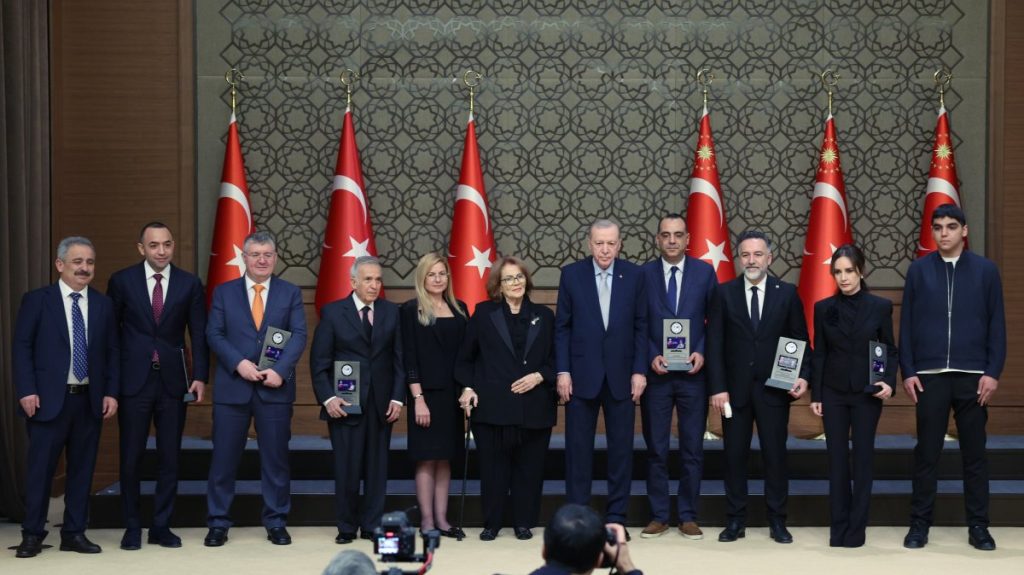A staunch defender of Palestinian rights, President Recep Tayyip Erdoğan on Tuesday lamented that the world remained silent as journalists were killed by Israel.
“Since we last convened here, many members of the press died across the world, primarily in Gaza,” Erdoğan told the audience at the 10th edition of Anatolia Media Awards held in the capital, Ankara.
“Israel’s ruthless attacks against Gaza killed 212 journalists. Before the very eyes of the world, before the very eyes of the foreign press where our opposition rush to complain about their country, Palestinian journalists are being slaughtered,” Erdoğan stated.
“I fondly remember each of those slain brothers and sisters who have been defenders of the truth,” he added.
Since Oct. 7, 2023, Palestinian journalists have faced an escalating risk of death, either while reporting in the field or in their homes, during Israeli airstrikes.
The Palestinian Center for Human Rights recently confirmed that 212 was the highest number of journalist deaths recorded globally in a single conflict since 1992. The Gaza Government Media Office reported that at least 409 media workers have been injured, 48 arrested and 21 influential social media journalists killed since October 2023. It said 28 journalist families have been wiped out entirely and 44 homes belonging to media professionals have been damaged or destroyed. Estimated losses to Gaza’s media sector have reached $400 million, including the destruction of news agencies, broadcast equipment and training centers.
Nation’s voice
In his speech, Erdoğan hailed “Anatolian media,” referring to local newspapers in Türkiye’s 81 provinces, for being “the nation’s voice” and “a responsible, national press that supports efforts for correctly informing the public against disinformation.”
“The ceremony today is a symbol of our solidarity for journalists fighting for truth in an era of disinformation and lies,” the president said. “As a politician who toured Anatolia many times, I am the primary witness of the difficult conditions members of the media worked. Local media struggles in the face of economic circumstances and at times, they have to fight against local bullies. We unfortunately witness how they are subject to attacks, pressure and threats,” he said.
Erdoğan also recalled how he was the subject of biased campaigns of certain media outlets in the past, especially during a period that led to his jailing, long before the foundation of his Justice and Development Party (AK Party).
“It is best to forget the horrible state the media was in, particularly during the Feb. 28 period,” he said, referring to times before and after the infamous 1997 coup.
Erdoğan, then Istanbul mayor and a rising politician, was among the targets of the media that sided with the secular elite behind the coup. Like other prominent figures of the time, Erdoğan was lumped with what pro-coup circles described as “reactionary” forces, a derogatory term for Muslims.
“Headlines of those days threatened the government, portrayed high school students as ‘spooks’ and so-called journalists stood watch outside imam-hatip schools for (witch hunts) against students,” he said.
Except for a few outlets, mainstream media openly supported attempts to disrupt the government co-governed by Erdoğan’s political mentor, late Prime Minister Necmettin Erbakan. The media portrayed Erbakan and members of his Welfare Party (RP) as figures seeking to “Islamize” the secular country. As a result, students wearing a headscarf or those attending prayers were often depicted as serving that purpose. Before and after the coup, students wearing headscarves were barred from attending schools, while conservative employees of the public sector or those perceived so, were forced to resign.
The president said those who “lost their status” after the era of the coup was over may object, but “Türkiye today is freer and home to a much more open media ecosystem.”
“In fact, to be frank, this atmosphere of freedom often crosses into irresponsibility and lawlessness. On issues of national security, especially, media organizations in our country operate with far more freedom than their Western counterparts.
“We have witnessed this many times, from the incident of the MIT trucks, to the Dec. 17–25 coup attempt, the Gezi Park protests and our country’s fight against terrorist organizations,” he stated, referring to media campaigns targeting Erdoğan’s past governments through plots orchestrated by Gülenist Terror Group (FETÖ). Acts of hostility against the state and the nation were portrayed as journalism. Türkiye was falsely depicted, in a deeply unethical way, as a country that supports terrorism. We were subjected to numerous operations by FETÖ aimed at undermining our democracy. We have not forgotten how certain groups in our country protected FETÖ operatives just because they attacked the government, or how the opposition supported the organization while we were fighting it at great personal risk,” he said.


